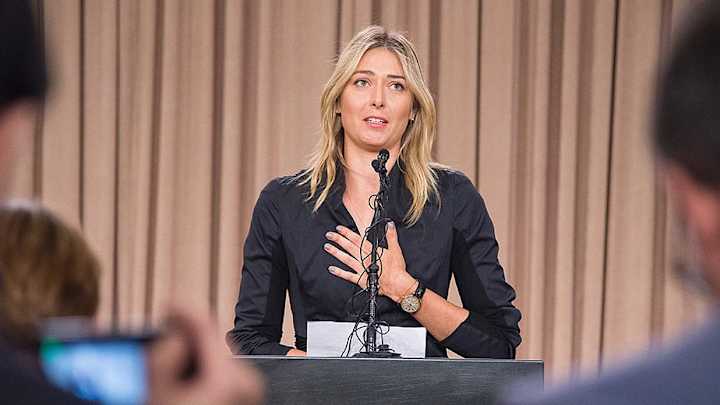Sharapova's attorney John Haggerty details failed drug test

In the wake of Maria Sharapova's announcement that she tested positive for a banned substance at the Australian Open on Monday, Jon Wertheim spoke with Sharapova's attorney John Haggerty over the phone shortly after the press conference in Los Angeles.
Sharapova was informed by the ITF that she tested positive for Meldonium, which was added to the World Anti-Doping Agency's list of banned substances on Jan. 1, 2016, in an in-competition test at the Australian Open, where she lost to Serena Williams in the quarterfinals on Jan. 26. Sharapova said she has legally been taking the drug for 10 years.
Jon Wertheim: What is the process going forward that isn’t otherwise specified by the ITF?
John Haggerty: The ITF’s site specifies the process—I won’t repeat it to you, that’s it. We are attempting to have a conversation with ITF up front because we think there are laundry list of extremely mitigating circumstances that once taken into consideration would result in a dramatically reducing any sanction that they might want to impose on Maria.
Maria Sharapova announces failed drug test at Australian Open
JW: What are you thoughts in general about strict liability in this area?
JH: My client believes that it's something that as a professional athlete its your obligation to know everything that goes into your body, so she has no problem with that standard and has for her entire career lived up to that standard. It was only for these 25 days in January that she had something in her body that was a prohibitive substance.
JW: Do you have any questions about chain of custody?
JH: At Maria’s instruction we have waived the testing of the beta sample.
She’s acknowledged that she was taking mildronate at the time of the Australian Open because she was unaware that it had just been put on the ban list on January 1st.
JW: What else do you want people to know here?
JH: I want people to know that for 10 years Maria took this substance, which was recommended to her by her doctor after he did an extensive battery of tests to determine what medical conditions were causing her to be sick on a frequent basis. He found that she had abnormal EKG readings, that she had some diabetes indicators and when he coupled that with a family medical history of those issues, as well as low magnesium and some immune deficiencies, it was his job as her doctor to prescribe or recommend the medication that would help her be healthy.
The SI Extra Newsletter Get the best of Sports Illustrated delivered right to your inbox
Subscribe
As it turned out, this was one of them. He checked them all and they were all not on the ban list and she was able to take them. These medications helped her. They brought her back to baseline, they eliminated or reduced some of the medical conditions she was dealing with. So with 10 years she proceeded on and legally and properly took this medication to keep these low-established medical conditions under control. Regrettably, when they added this to the ban list on January 1 of this year, she did not pick that up. So for 25 days out her long career she was not in compliance with the WADA requirements for banned substances.
JW: This drug isn’t approved by the FDA, as I understand it. Are you at liberty to give us information about how it was acquired? Was it an overseas prescription?
What is Meldonium? The drug behind Maria Sharapova’s positive test
JH: I’m not at liberty to talk about that because of the ITF process and the confidentiality involved about sharing her medical information, so I can’t go beyond what we discussed at that point.
JW: Have you ever had a case like this before?
JH: Yes, we’ve been involved in these types of matters before. Not one where a person like Maria has said I took it and let’s get right to it like this. But I think that goes to show how strong of integrity she has as a human being.
JW: She had mentioned she started to take this in 2006, 10 years ago. Is that systematic? I don’t much about how often this is prescribed or what the nature of the consumption is. Is this periodic or steady?
JH: She took it on a regular basis as recommended by her doctor. He told her what to take and when to take it, and then continued to test her and confirm that it was giving her the desired improved medical condition.

Jon Wertheim is a senior writer for Sports Illustrated and has been part of the full-time SI writing staff since 1997, largely focusing on the tennis beat , sports business and social issues, and enterprise journalism. In addition to his work at SI, he is a correspondent for "60 Minutes" and a commentator for The Tennis Channel. He has authored 11 books and has been honored with two Emmys, numerous writing and investigative journalism awards, and the Eugene Scott Award from the International Tennis Hall of Fame. Wertheim is a longtime member of the New York Bar Association (retired), the International Tennis Writers Association and the Writers Guild of America. He has a bachelor's in history from Yale University and received a law degree from the University of Pennsylvania. He resides in New York City with his wife, who is a divorce mediator and adjunct law professor. They have two children.
Follow jon_wertheim